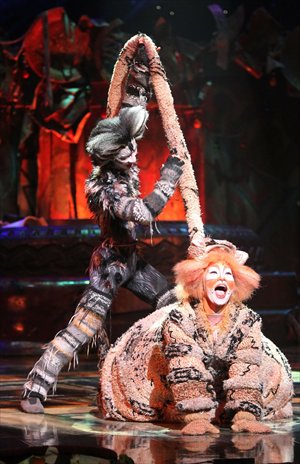Musical madness

Broadway and the West End are building a following in China. Musical producers are starting to see potential for domestically-staged versions of the biggest names in Western musicals, such as Mamma Mia! and Cats, and homegrown musicals are gaining more traction.
In its Chinese-language, nationwide tour, Mamma Mia! grossed 80 million yuan ($1.28 million) from July 2011 to early 2012, and attracted 250,000 theater goers. It garnered back-to-back sold-out shows at the Century Theater in Chaoyang district, where a Chinese translation of Cats is set to open December 21.
Despite this recent growth, the musical industry is still in its infancy in China.
A bumpy start
In 1988, Japan's Shiki Theatre Company, led by its artistic director Asari Keita, visited China and brought Hans Christian Andersen to Beijing, sparking a sensation. Keita, who pioneered musicals in Japan, helped the Central Academy of Drama set up a musical acting class and introduced more Western productions. But the trend was slow to catch on.
The two productions at the Century Theater seem to show the musical finally gaining momentum in the capital. In addition, local musicians have also made big attempts to turn out locally-made productions, including Butterflies, a 40-million-yuan production with music written by veteran Chinese musician San Bao.
Compared with original Broadway productions, though, Chinese audiences have given lukewarm receptions to original Chinese productions, and the Chinese musical industry has failed to produce a hit.
Yang Jiamin, CEO of the Beijing-based Seven Ages Company, said the problem with homegrown productions is that they are often dominated by music or acting, rather than seemlessly blending song, dialogue, acting and dance.
The cultural aspect is also one big barrier for musicals in China, said Ziyin Wang Ganter, co-producer of the bilingual musical Cho Cho with the National Theater of China, scheduled to debut in Beijing mid-January. There is no exact equivalent in China, save for perhaps the traditional Chinese xiqu.
"The reason that Mamma Mia! was so popular is not because of the story, but because the songs by ABBA are so well-known, " said Ganter. "A lot of Broadway musicals are about life in New York. The localized productions are not very relevant."
Hefty investments
Most musicals must run for a long duration to make money. Due to the small target audience in China, it is hard for many productions here to gain enough popularity to tour.
"Musicals are still something of a novelty here in China," said Joseph Graves, a veteran musical actor on Broadway and also artistic director of Seven Ages. "In America, every kid grew up with musicals. Here there are a comparatively few people who even know about musical theater."
Localizing or original
Localization is not the solution to produce big musical hits, said Yang, but at the moment, it could be a good way to make the genre known to more audiences. Ganter agrees. "Chinese audiences have different habits from Western audiences," Ganter said. "Only productions made in Chinese and to the liking of the local audience can hope to succeed in this market."